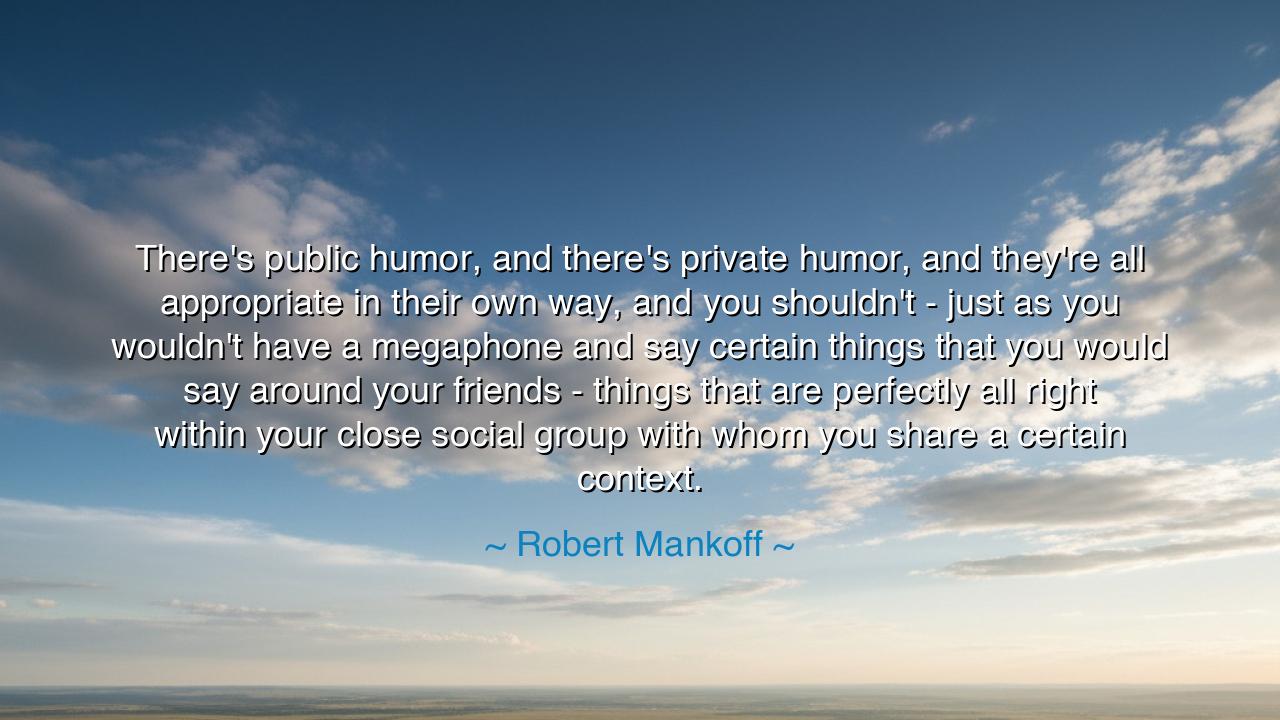
There's public humor, and there's private humor, and they're all
There's public humor, and there's private humor, and they're all appropriate in their own way, and you shouldn't - just as you wouldn't have a megaphone and say certain things that you would say around your friends - things that are perfectly all right within your close social group with whom you share a certain context.






In the sacred realm of communication, where the exchange of words holds the power to influence minds and shape societies, there exists a wisdom that must be understood by all who seek to speak, to connect, and to share: the difference between public humor and private humor. Robert Mankoff, a master of wit and observation, speaks to this truth when he states, "There's public humor, and there's private humor, and they're all appropriate in their own way, and you shouldn't - just as you wouldn't have a megaphone and say certain things that you would say around your friends - things that are perfectly all right within your close social group with whom you share a certain context." These words touch upon a fundamental principle of human interaction: context and audience shape the appropriateness of what is said, and humor, when wisely used, can either connect or divide.
In the ancient Greek world, the distinction between public and private was clear. The philosophers, especially Plato, understood that what was said in the public square had different implications than what was whispered among friends in the privacy of a home. In his dialogues, Plato used the character of Socrates to demonstrate how certain truths and humors were appropriate only in the right contexts. When Socrates questioned his fellow Athenians in the public square, his humor was often sharp, even biting, but always measured by the audience’s capacity to understand and engage. Yet when Socrates spoke with his closest followers, the humor was more personal, more playful, and reflected a deeper intimacy—one that was grounded in shared context and mutual respect.
The wisdom of context can also be seen in the works of Aristophanes, the great master of Greek comedy. His plays, which were full of incongruity and absurdity, were often directed at the public, lampooning the powerful and ridiculing the gods. However, his humor was always embedded in the cultural context of Athens, where everyone understood the satirical nature of his wit. Aristophanes knew well that what could be laughed at in the theater was not the same as what might be appropriate in private conversations. In this way, he navigated the fine line between public humor—which served to critique society—and private humor, which, within close-knit groups, could serve to build camaraderie and trust.
Consider also the Romans, who, like the Greeks, appreciated the power of humor but understood its contextual nature. The orator Cicero, whose speeches were as sharp as they were persuasive, knew that what he spoke in the Senate or before a crowd was very different from what he might share at a private dinner. In public, Cicero’s words had to be measured, full of rhetorical grandeur and precision, while in private, with trusted companions, his humor could be far more spontaneous and personal, revealing a different side of his character. This ancient practice of knowing when and where to speak, and the tone in which to deliver humor, was an understanding that humor must be adapted to the audience and the situation.
The lesson we can glean from Mankoff’s words is a profound one: in the complex world of human relationships, humor must be wielded with awareness. Just as a megaphone can amplify words and ideas for all to hear, so too can humor, when spoken in the wrong context, divide or alienate. What is said in the intimacy of friends can easily become inappropriate when broadcasted to a wider audience who may not share the same understanding or context. Thus, humor requires discernment, and the ability to sense not only the moment, but the audience and the mood of the time. In this, we see that the art of humor is not merely in its delivery, but in its timing and sensitivity to the environment in which it is shared.
In our own lives, we must learn to navigate the spaces where humor can either connect or divide. Whether in professional settings, where humor must remain respectful and appropriate, or in private conversations with loved ones, where humor can be more casual and free, we must understand that not all humor is created equal. We must listen to the environment around us, observe the reactions of those we are with, and adapt our words to meet the needs of the moment. To speak as though all humor is appropriate in every context is to misunderstand the delicate balance that makes humor both powerful and human.
Thus, let us take this wisdom and apply it in our lives. Let us cultivate awareness of the contexts in which we speak, knowing that our words—whether humorous or serious—can have a profound impact on those who hear them. Let us seek to understand our audience, whether in public or private, and adjust our humor accordingly. In doing so, we will not only connect more deeply with those around us, but we will honor the wisdom of ancient traditions, where context, timing, and sensitivity were valued as essential elements of wise speech. By understanding the power of contextual humor, we will find ourselves more attuned to the needs of others and more able to use humor as a bridge, not a barrier.






AAdministratorAdministrator
Welcome, honored guests. Please leave a comment, we will respond soon